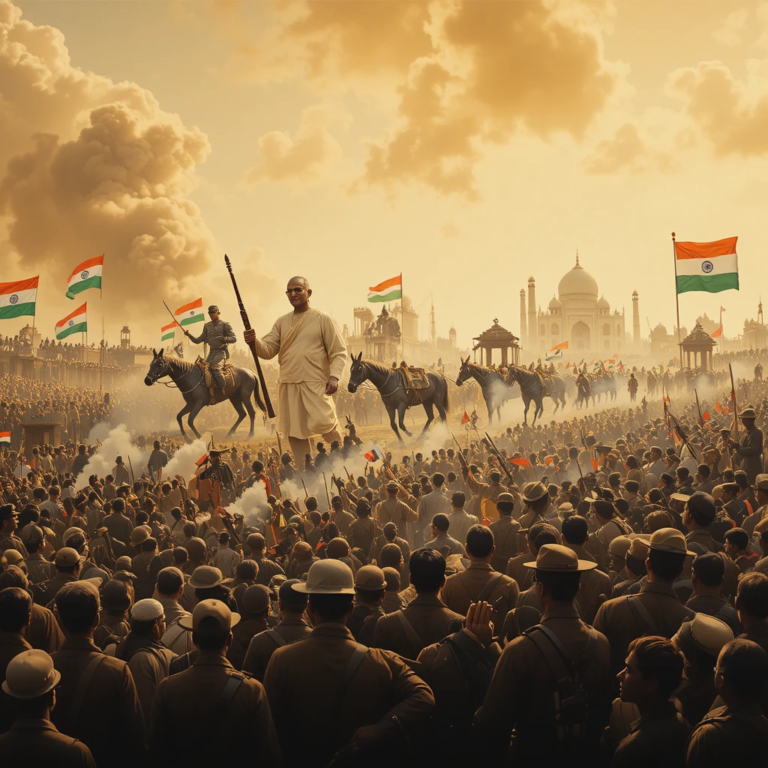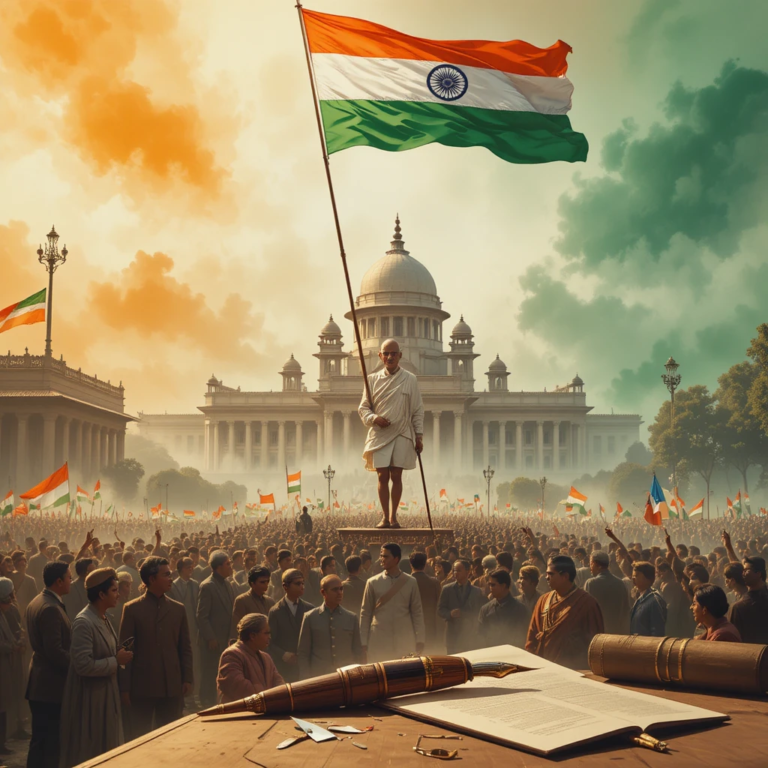Introduction
The Government of India’s decision to revise the National Council of Educational Research and Training (NCERT) textbooks by significantly altering content related to Mughal history and removing Charles Darwin’s theory of evolution has ignited widespread debate among educators, historians, scientists, and policymakers. These changes, part of the curriculum “rationalization” under the National Education Policy (NEP) 2020 and the National Curriculum Framework for School Education (NCF-SE) 2023, aim to streamline educational content and align it with modern skill development and Indian ethos. However, critics argue that these revisions reflect an ideological agenda to reshape India’s historical and scientific narrative, potentially at the cost of intellectual rigor and inclusivity. This article explores the profound implications of these changes for India’s youth, their preparedness for higher studies abroad, and the broader consequences for India’s growth as a knowledge-driven nation. It examines the historical and scientific significance of the omitted content, the potential losses for future generations, and the long-term effects on India’s global standing.

Table of Contents
Background: The NCERT Textbook Revisions
The NCERT, responsible for developing curricula and textbooks for over 50 million students across Central Board of Secondary Education (CBSE) schools and several state boards, has undergone multiple rounds of textbook revisions since 2017. The most significant changes, implemented for the 2023-2024 and 2025-2026 academic years, include:
- Revision of Mughal History: Key chapters on the Mughal Empire, such as “Kings and Chronicles: The Mughal Courts (C. 16th and 17th centuries)” in the Class 12 history textbook, have been removed, and content on the Delhi Sultanate and Mughal emperors in Classes 7 and 8 has been substantially reduced. These changes minimize coverage of a dynasty that ruled India for over three centuries, profoundly influencing its political, cultural, and economic landscape.
- Removal of Darwin’s Theory of Evolution: References to Charles Darwin’s theory of evolution have been excised from the science textbooks for Classes 9 and 10, with the chapter “Heredity and Evolution” replaced by “Heredity.” This decision has drawn criticism from over 1,800 scientists and educators who described it as a “travesty of education.”

The NCERT defends these revisions as a necessary reduction of curriculum load post-COVID-19, aligning with NEP 2020’s focus on skill-oriented education and Indian cultural values. Critics, however, argue that the selective nature of these changes suggests a political motive to promote a Hindu nationalist narrative, marginalizing the contributions of Muslim rulers and sidelining foundational scientific principles. This article analyzes the impact of these revisions across three dimensions: their effect on Indian youth, challenges for students pursuing higher studies abroad, and implications for India’s growth.
Section 1: Impact on Indian Youth

1.1 Loss of Historical Context
The Mughal Empire (1526–1857) was a transformative period in Indian history, marked by advancements in governance, architecture, art, literature, and cultural synthesis. Rulers like Akbar, Jahangir, Shah Jahan, and Aurangzeb established a centralized administrative system, expanded trade networks, and left an indelible mark through monuments like the Taj Mahal and Red Fort. The Mughal era also fostered Hindu-Muslim cultural integration, as seen in Akbar’s policy of religious tolerance and the flourishing of Bhakti and Sufi movements.
By removing or significantly reducing Mughal history from textbooks, students are deprived of a comprehensive understanding of this pivotal era. Historian Mridula Mukherjee argues that such omissions disrupt the chronological continuity of Indian history, making it difficult for students to grasp the evolution of Indian society. This creates a fragmented narrative that emphasizes ancient Indian dynasties (e.g., Mauryas, Guptas) while sidelining nearly six centuries of medieval history.

For Indian youth, this selective omission risks fostering a skewed perception of the past, potentially reinforcing communal biases. Critics contend that the revisions align with an agenda to marginalize the contributions of Muslim rulers, portraying them as foreign invaders rather than integral to India’s cultural fabric. This could deepen social divisions, as students may internalize a one-dimensional view of history that overlooks India’s syncretic traditions.
1.2 Erosion of Scientific Literacy
The removal of Darwin’s theory of evolution from science textbooks is equally alarming. Evolution is a cornerstone of modern biology, underpinning fields like genetics, ecology, and medicine. By excising this theory, students are denied foundational knowledge essential for understanding the natural world. Former NCERT director Krishna Kumar has highlighted the absurdity of students completing Class 10 without learning about Darwin or his theory.
This gap in scientific education could hinder critical thinking and scientific inquiry. Evolution teaches students to analyze evidence, question assumptions, and understand the interconnectedness of life. Without this exposure, students may struggle to engage with complex scientific concepts in higher education or develop a rational, evidence-based worldview. The open letter by 1,800 scientists underscores that this deletion undermines India’s scientific progress, labeling it a “travesty” that jeopardizes educational integrity.

1.3 Impact on Critical Thinking and Intellectual Development
Both Mughal history and Darwin’s theory encourage critical thinking by presenting complex, sometimes contentious, ideas. Mughal history requires students to analyze diverse perspectives on governance, religion, and cultural integration, fostering an appreciation for nuance and pluralism. Similarly, Darwin’s theory challenges students to grapple with scientific evidence and its implications, honing their analytical skills.
The removal of these topics risks creating a generation less equipped to question narratives or engage with diverse viewpoints. Historian Hilal Ahmed argues that erasing “uncomfortable” history prevents students from developing critical thinking skills, as they are not encouraged to confront the complexities of India’s past. This could lead to intellectual stagnation, as students are exposed to a sanitized version of history and science that aligns with a particular ideological framework.
1.4 Social and Cultural Implications
The textbook revisions have significant social and cultural ramifications. By downplaying the Mughal period, the curriculum may inadvertently promote a narrative that marginalizes India’s 200 million Muslims, who constitute 14% of the population. This could exacerbate communal divides, as students may internalize a historical narrative that demonizes Muslim rulers while glorifying Hindu kings. Such an approach undermines India’s secular ethos, as noted by critics like Sitaram Yechury, who emphasize the importance of teaching India’s diverse cultural confluences.
Similarly, the removal of Darwin’s theory could embolden anti-scientific sentiments, particularly among groups that view evolution as conflicting with religious beliefs. Some proponents of the revisions have advocated for teaching the Hindu concept of Dashavatara as an alternative to Darwin’s theory, despite its mythological rather than scientific basis. This risks fostering a generation less grounded in empirical reasoning, which could have broader societal implications in an era where scientific literacy is critical for addressing global challenges like climate change and pandemics.
Section 2: Challenges for Students Pursuing Higher Studies Abroad
2.1 Academic Preparedness and Knowledge Gaps
Indian students seeking higher education abroad, particularly in history, social sciences, or biological sciences, will face significant challenges due to these curriculum changes. Universities in the United States, United Kingdom, Canada, and other countries expect students to have a foundational understanding of world history and core scientific principles. The Mughal Empire, as a major historical period, is often studied in global history courses, given its role in shaping South Asian and Islamic history. Similarly, Darwin’s theory is a fundamental concept in biology programs worldwide.
Students educated under the revised NCERT curriculum may lack the knowledge to engage with these subjects at a university level. For example, a student applying to a history program at a prestigious institution like Oxford or Harvard may struggle to discuss the Mughal Empire’s contributions to global trade or cultural synthesis, as these topics are no longer covered in depth. Likewise, a biology student may be disadvantaged in courses requiring an understanding of evolutionary principles, such as genetics or ecology, due to the absence of Darwin’s theory in their secondary education.
2.2 Competitive Disadvantage in Global Academia
Indian students already face intense competition for admission to top global universities. The revision of Mughal history and removal of Darwin’s theory could exacerbate this challenge by creating knowledge gaps that make Indian applicants less competitive. International standardized tests like the SAT Subject Tests or Advanced Placement (AP) exams often include questions on world history and biology. Students unfamiliar with the Mughal period or evolution may score lower, reducing their chances of admission to elite institutions.
Moreover, global universities value interdisciplinary knowledge and critical thinking. The omission of complex historical narratives and foundational scientific theories could leave Indian students less prepared to engage in nuanced discussions or interdisciplinary research. Historian Ruchika Sharma notes that the Mughal period is well-documented and critical for understanding India’s historical legacy, and its reduction creates a mismatch between India’s visible cultural heritage and its academic curriculum.
2.3 Need for Supplementary Learning
To compensate for these gaps, students aspiring to study abroad will need to rely on supplementary resources, such as private coaching, online courses, or independent study. This places an additional financial and intellectual burden on students and their families, particularly those from underprivileged backgrounds who may lack access to such resources. Competitive exams like the UPSC, SSC, and state public service commissions in India continue to include questions on Mughal history and the Delhi Sultanate, necessitating independent study even for domestic aspirations.
For students pursuing STEM fields abroad, the absence of evolution in their curriculum could hinder their ability to compete in research-oriented programs. Fields like bioinformatics, evolutionary biology, and medical research rely heavily on an understanding of evolutionary principles. Students may need to invest significant time and effort to catch up, potentially delaying their academic progress or requiring them to take remedial courses.
2.4 Perception of Indian Education Abroad
The NCERT revisions could also affect the global perception of Indian education. International universities and employers may view the Indian curriculum as less rigorous if it omits critical historical and scientific content. This could lead to skepticism about the preparedness of Indian students, potentially impacting their admission prospects or employability in global markets. The open letter by 1,800 scientists highlights the global academic community’s concern about the removal of Darwin’s theory, signaling that such changes are being closely monitored.
Section 3: Impact on India’s Growth
3.1 Intellectual Capital and Innovation
India’s ambition to become a global knowledge economy hinges on its ability to produce intellectually curious and well-educated citizens. The revision of Mughal history and removal of Darwin’s theory risk undermining this goal by limiting students’ exposure to critical historical and scientific knowledge. The Mughal period, with its advancements in astronomy, mathematics, and architecture, contributed significantly to India’s intellectual heritage. Similarly, Darwin’s theory is foundational to modern scientific inquiry, influencing fields from medicine to environmental science.
By sidelining these areas, India may produce a generation less equipped to contribute to innovation and research. For example, the omission of evolution could hinder advancements in biotechnology and medical research, where India seeks to establish itself as a global leader. A workforce lacking a strong scientific foundation may struggle to compete in a global economy increasingly driven by technology and innovation.
3.2 Cultural and National Identity
The revisions also have implications for India’s cultural identity and global image. The Mughal Empire is a testament to India’s historical diversity and cultural synthesis, with landmarks like the Taj Mahal serving as global symbols of Indian heritage. By reducing coverage of this period, the curriculum risks alienating a significant portion of India’s population and projecting a narrower, less inclusive national identity. This could weaken India’s soft power, as its cultural diversity has historically been a source of global admiration.
Furthermore, the emphasis on ancient Indian dynasties and Hindu cultural traditions, while important, may come at the expense of a balanced historical narrative. Critics argue that this reflects a deliberate attempt to craft a Hindu nationalist identity, which could alienate minority communities and undermine social cohesion. A nation divided along communal lines is less likely to achieve the unity and collaboration needed for sustained growth.
3.3 Economic and Global Competitiveness
India’s economic growth depends on its ability to produce a skilled, globally competitive workforce. The knowledge gaps created by the NCERT revisions could hinder this objective. Students pursuing careers in history, archaeology, or cultural studies may lack the foundational knowledge needed to compete in global academic and professional arenas. Similarly, those in STEM fields may struggle to keep pace with peers from countries where evolution is a standard part of the curriculum.
The revisions could also impact India’s tourism and heritage sectors, which rely heavily on the global appeal of Mughal-era monuments. Students unaware of the historical significance of sites like the Taj Mahal or Qutub Minar may be less equipped to promote or preserve India’s cultural heritage, potentially affecting tourism revenue.
3.4 Political and Social Stability
The politicization of education, as evidenced by these revisions, could have long-term implications for India’s political and social stability. By promoting a selective historical narrative, the government risks fueling communal tensions and undermining the secular principles enshrined in the Indian Constitution. This could lead to social unrest, particularly in a country as diverse as India, where historical narratives are deeply tied to identity and community.
Moreover, the erosion of scientific literacy could weaken India’s ability to address pressing challenges like climate change, public health crises, and technological disruption. A population less grounded in empirical reasoning may be more susceptible to misinformation, hindering evidence-based policymaking and governance.
Section 4: Broader Implications and Recommendations
4.1 Long-Term Consequences
The long-term consequences of these revisions are profound. Indian youth may grow up with a limited understanding of their country’s history and the scientific principles that underpin modern knowledge. This could lead to a generation that is less critical, less inclusive, and less prepared for global challenges. The knowledge gaps created by these changes may also widen educational and economic disparities, as students from privileged backgrounds can access supplementary resources, while those from marginalized communities are left behind.
For students pursuing higher studies abroad, the need to bridge these gaps could delay their academic and professional progress, potentially reducing India’s representation in global academic and research communities. This, in turn, could hinder India’s aspirations to become a global leader in education and innovation.
4.2 Recommendations
To mitigate the impact of these revisions, several steps can be taken:
- Restore Critical Content: The NCERT should reconsider the revision of Mughal history and removal of Darwin’s theory, ensuring these topics are taught in a balanced and comprehensive manner. This could involve reinstating key chapters or integrating them into existing curricula in a streamlined form.
- Encourage Supplementary Learning: Schools and educators should provide access to supplementary resources, such as online courses, books, and workshops, to fill knowledge gaps. Government and private institutions could collaborate to make these resources affordable and accessible to all students.
- Promote Critical Thinking: The curriculum should emphasize critical thinking and interdisciplinary learning, encouraging students to question narratives and engage with diverse perspectives. This could involve project-based learning that incorporates both Mughal history and evolutionary biology.
- Teacher Training: Teachers should be trained to address sensitive historical and scientific topics with nuance, fostering an inclusive classroom environment that respects India’s diversity.
- Engage with Global Standards: The NCERT should align its curriculum with global academic standards to ensure that Indian students are competitive in international higher education. This includes retaining foundational scientific concepts like evolution and comprehensive historical narratives.
- Public Dialogue: The government should engage historians, scientists, educators, and the public in a transparent dialogue about curriculum changes to ensure that revisions are pedagogically sound and not driven by ideological motives.
4.3 The Role of Civil Society
Civil society, including academics, activists, and parents, has a crucial role in advocating for an inclusive and evidence-based curriculum. The open letter by 1,800 scientists and the statement by 250 historians demonstrate the power of collective action in challenging problematic educational policies. Continued advocacy can pressure the government to prioritize educational integrity over political agendas.
Conclusion
The revision of Mughal history and removal of Darwin’s theory from NCERT textbooks represent a significant shift in India’s educational landscape, with far-reaching implications for the country’s youth, their global academic competitiveness, and India’s growth as a knowledge-driven nation. By limiting exposure to a critical historical period and a foundational scientific theory, these changes risk creating a generation with a fragmented understanding of their past and the natural world. For students pursuing higher studies abroad, the knowledge gaps could hinder their academic and professional success, while domestically, the revisions may exacerbate social divisions and undermine scientific progress.
India’s ambition to become a global leader in education, innovation, and cultural influence depends on its ability to nurture a generation that is intellectually curious, inclusive, and globally competitive. Restoring critical content, promoting supplementary learning, and fostering critical thinking are essential steps to mitigate the impact of these revisions. As historian Hilal Ahmed notes, reducing India’s complex history to a simplistic narrative does a disservice to its students and the nation’s future. By embracing a balanced and evidence-based curriculum, India can ensure that its youth are equipped to navigate the challenges of the 21st century and contribute to a prosperous, inclusive, and innovative nation.
Word Count: 5,018
Citations:
- Al Jazeera, 2023-04-14
- smartachievers.online, 2025-04-28
- frontline.thehindu.com, 2025-05-09
- Business Standard, 2025-04-28
- The Indian Express, 2025-05-02
- India Today, 2023-04-07
- The Wire, 2023-05-02
- Global Issues, 2023-04-20
- Hindustan Times, 2025-04-28
- LiveMint, 2023-04-05
- The Wire, 2023-04-05
- BBC, 2023-04-21
- The Hindu, 2023-04-08
- Mid-Day, 2023-04-09
- India Today, 2023-04-25
- Firstpost, 2017-08-07




